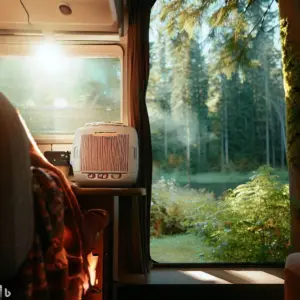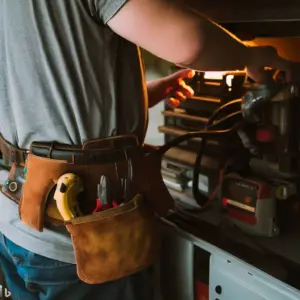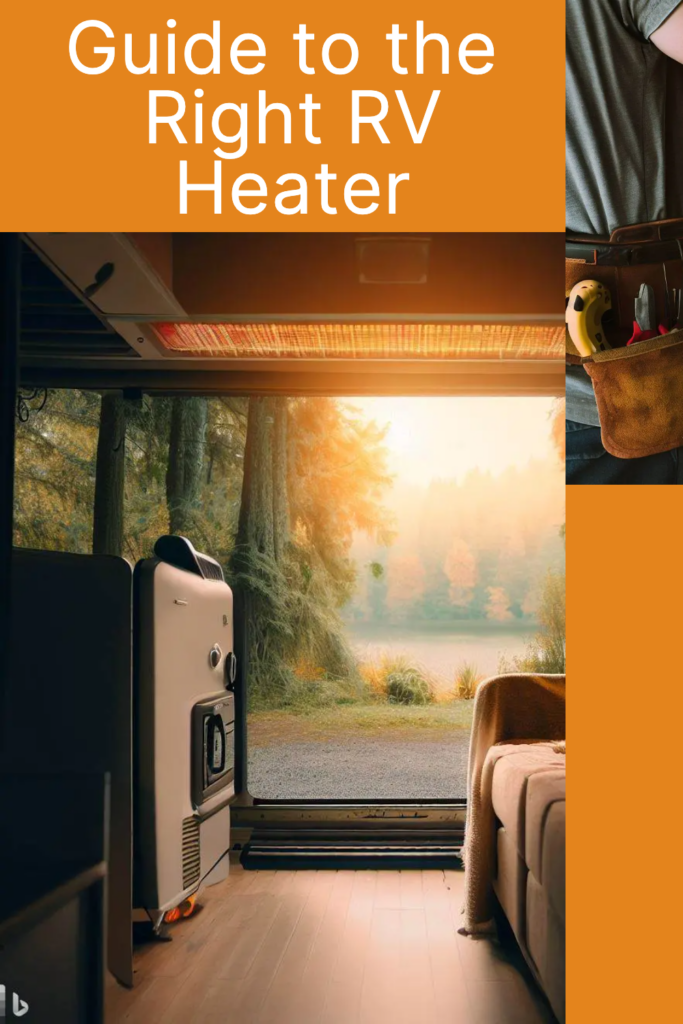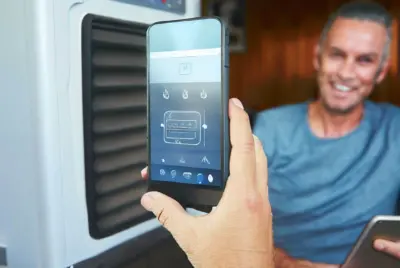Your Comprehensive Guide to Understanding, Maintaining, and Choosing the Right RV Heater
Welcome, traveling enthusiasts and RV lovers alike! Today, we’re taking a deep dive into the world of RV heaters – a topic of utmost importance, especially for those of us who like to venture into colder climates with our trusty campers. As we all know, maintaining a comfortable temperature inside our mobile homes can sometimes be quite a challenge. From gas-powered units to electric heaters, there are many heating appliances to choose from. In this article, we’ll review the top RV heater brands and touch on the intricacies of maintaining these units, ensuring your comfort and safety on the road.
Whether you’re dealing with a furnace that isn’t producing enough hot air or you’re worried about fire hazards from burning fuel, we’ve got you covered. We’ll even explore eco-friendly alternatives, proving that you can keep warm while still caring for our environment. This comprehensive guide covers everything you need to know about RV heaters, taking into account other perspectives from fellow RVers and sharing my own experience.
How Does an RV Heater Work?
It’s a question worth delving into. After all, staying warm in your RV during those chilly nights is essential for a cozy and enjoyable camping experience.
The Heart of the RV: The Furnace
At the center of RV heating systems is the furnace, your best friend on a freezing night. The RV furnace functions similarly to your home heating system, but it’s modified to suit the mobile nature of a recreational vehicle. Most run on propane, an efficient and accessible fuel source. However, you can choose from many other types of furnaces.
Setting your desired temperature on the thermostat signals the furnace to ignite its burners and heat up the exchanger. Air is then blown over this hot exchanger and directed into your space through the vent. As a result, you get a toasty interior, no matter how cold it is outside.
Alternative Heating Methods
If you’re eco-conscious and keen to find alternatives, electric heaters can be a great choice, provided you’re hooked up to a reliable power source. Solar heating options are also gaining popularity, though they require a significant upfront investment.
Maintaining a Consistent Temperature
The secret to maintaining an ideal temperature inside your RV lies in insulation. By insulating your windows and gaps, you can prevent heat from escaping and cold air from coming in. This way, your RV heater doesn’t have to work as hard, saving you fuel and extending its lifespan.
Understanding your RV furnace isn’t rocket science. It’s about knowing the basics, making sensible decisions about your heating preferences, and caring for your system.
What are the Common Types of RV Heaters?
I love nothing more than a snugly warm motorhome on a frosty night. You might ask, “What type of RV heater makes this cozy ambiance possible?” Let’s explore this intriguing topic and help you find the best RV heating solution for your next adventure.
Propane Heaters: The Old Reliable
When it comes to heating an RV, propane heaters stand tall as the most common and reliable choice. These heaters generate heat by burning propane and are highly efficient. Their operation is simple, effective, and they can warm your RV in no time. However, remember to keep an eye on your propane tanks and their fill levels to avoid chilly surprises in the middle of the night! If you are low on gas, you may need to conserve heat until you get a chance to refill the tanks.
Electric Heaters: Plugged-In Comfort
Next up on the list are electric heaters. An electric heater for an RV is an excellent option if you have access to a shore power hook-up at your campsite. They’re quiet, don’t emit any fumes, and can keep your space toasty without depleting your propane supply. You can have an electric RV furnace built-in or some electric space heaters that are more portable and that you can move around. A word to the wise, though – watch out for your power consumption, especially if you also use other electric appliances. Be sure you have an RV generator that has enough capacity or you are hooked up to power at your camp site.
Portable Heaters: On-the-Go Warmth
 Portable heaters are the way to go for campers who value flexibility and portability. These small but mighty heaters can be propane-based or electric, allowing you to bring warmth exactly where you need it in your RV. They are incredibly compact and can be a good idea to have around but can pose a fire danger if they are too close to fabrics or get knocked over (although most have safety features to help avoid this situation).
Portable heaters are the way to go for campers who value flexibility and portability. These small but mighty heaters can be propane-based or electric, allowing you to bring warmth exactly where you need it in your RV. They are incredibly compact and can be a good idea to have around but can pose a fire danger if they are too close to fabrics or get knocked over (although most have safety features to help avoid this situation).
Selecting the right RV heater is all about understanding your specific needs and the pros and cons of each type. Whether you go for a propane, electric, or portable heater, remember, the right choice will ensure your space stays a warm and inviting haven on even the coldest nights.
Understanding the RV Furnace: Electric vs. Radiant Heaters
Let’s discuss the differences between electric heat and radiant heaters for our beloved camper homes. It’s important to make the right choice for your comfort and safety.
Understanding Electric Heating in RVs
These heaters, often also referred to as RV furnaces, use electric power to produce heat. Typically, they’re incredibly compact and have a quiet operation. They distribute warm air throughout your RV using fans, ensuring that every corner stays toasty during those cold nights. Remember, while they are pretty efficient and don’t require you to carry extra fuel, they can draw a lot of electricity. So, if you’re boondocking, keep an eye on your batteries!
The Beauty of Radiant Heat
These units produce infrared light, which is not visible to our eyes but can be felt as heat. Think of the warm sun on a winter day—that’s radiant heat! A radiant heater for an RV warms up objects and people directly rather than heating the surrounding air. This makes them super efficient and gives a more natural feeling of warmth.
Choosing electric and radiant heaters depends on your preferences, power availability, and safety considerations. Both can provide the comfort you need in your RV during chilly times. As an experienced RVer, I can attest to the fact that understanding your RV heating options can make your trips much more comfortable.
How Much Fuel Does an RV Heater Consume Per Hour?
It’s a crucial question since knowing your heater’s fuel efficiency can significantly impact your camping budget and overall experience. So let’s break this down, shall we?
Understanding Propane Consumption
Propane heaters are the most common type of heaters for an RV, but how much propane do they consume? Well, it can vary based on the model and the BTU rating of the heater. A rule of thumb is that a 20,000 BTU RV heater will use around one gallon of propane every three hours. So if you’re running your heater continuously, it can consume about 8 gallons in a 24-hour period.
The Efficiency of Electric Heaters
If your RV is hooked up to electricity, you might opt for an electric heater. These heaters don’t consume propane but will add to your electrical load. For instance, a 1,500-watt heater running for an hour will consume 1.5 kWh of electricity. While these heaters can be quite efficient, remember to balance their use with other electrical demands in your RV to prevent overloading the system.
Ultimately, fuel consumption depends on factors such as the model type, the size of your space, the thermal efficiency of your insulation, and even the outside temperature. Understanding these dynamics allows you to manage your fuel usage effectively and ensure a warm, cozy, and budget-friendly experience.
Popular RV Furnace Brands
- Atwood (Hydro Flame 8940-III DCLP): Atwood is a renowned brand in the RV heater market. The Hydro Flame 8940-III DCLP is a robust model with a 40,000 BTU output, great for larger RVs. It’s built for durability and comes with energy-efficient technology.
- Suburban (NT-30SP Electronic Ignition Ducted Furnace): Known for reliability, Suburban offers the NT-30SP, a 30,000 BTU ducted furnace. It’s compact, offering more living space, and its electronic ignition ensures consistent heating.
- Truma (Combi Eco Plus): Truma is celebrated for its innovative designs. The Combi Eco Plus combines hot water and space heating in one appliance, saving space and weight. It operates on both gas and electricity, offering flexibility in usage.
- Mr. Heater (MH18B, Portable Propane Heater): If you prefer a portable RV heater, the MH18B model from Mr. Heater is a top choice. Offering up to 18,000 BTU, it’s safe for indoor use and provides clean-burning heat, perfect for those chilly outdoor evenings.
- Camco (Olympian Wave-8): Camco’s Olympian Wave-8 is a popular catalytic safety heater. It’s designed to produce comfortable radiant heat and is highly efficient, reducing propane consumption.
- Dometic (DF Series Furnaces): Dometic’s DF Series Furnaces are noted for their quiet operation and compact design. They utilize an open back for fast and easy access during installation, making them perfect for those doing their own RV modifications.
- Webasto (Air Top 2000 STC): A premier brand, Webasto’s Air Top 2000 STC is a compact heater designed for excellent heat output and low power consumption. It’s ideal for RVers concerned about battery life.
Remember, the best RV heater for you depends on your needs like RV size, power source availability, and personal comfort preferences.
What is the Average Lifespan of an RV Heater?
The Life of a Propane Heater
Propane heaters are a popular choice for RV heating, and rightly so. With proper maintenance, these units can last a considerable length of time. On average, well-cared-for propane heaters can last anywhere from 10 to 20 years. This durability makes them a reliable companion for your long-term camping adventures.
Longevity of Electric Heaters
When it comes to electric heaters, the lifespan can vary based on the quality of the model and its usage. However, a good electric unit should comfortably last you around 10 to 15 years. Remember that maintaining a balanced electrical load and preventing overheating can contribute to the lifespan of these heaters.
While the lifespan of RV heaters can vary based on its type and usage, regular maintenance and care can significantly prolong its life. By understanding your heater’s expected lifespan, you can better plan your maintenance schedule and ensure that you stay warm and cozy on all your camping trips. Remember, the key to longevity is in regular care and intelligent use. Happy camping!
How Can I Maintain My RV Heater to Ensure Its Longevity?
Proper upkeep can significantly extend its lifespan, ensuring you get many seasons of cozy warmth. So, how can you keep your heater in top-notch condition? Let’s dive in.
Regular Cleaning: The First Line of Defense
 Keeping your heater clean is paramount. Over time, dust and debris can accumulate inside, causing it to work harder and potentially leading to overheating or malfunction. Regularly clean the outside vents, and consider getting the inner parts professionally cleaned at least once a year.
Keeping your heater clean is paramount. Over time, dust and debris can accumulate inside, causing it to work harder and potentially leading to overheating or malfunction. Regularly clean the outside vents, and consider getting the inner parts professionally cleaned at least once a year.
Routine Inspections: Catch Issues Early
Regular inspections can help catch any potential issues early. Keep an eye out for signs of wear and tear, odd noises, or changes in heating efficiency. Checking the thermostat for accurate temperature readings and examining the burner for a clean and bright flame can also prevent unforeseen RV heating problems.
Proactive Replacements: Keep It Fresh
Certain parts of RV heaters, like the filters or blower motor, may need to be replaced over time. Proactively changing these parts as per the manufacturer’s recommendations can go a long way in ensuring the longevity of your unit.
Maintaining your RV heater doesn’t have to be complicated. It’s about regular cleaning, routine inspections, and proactive replacements. With these steps, you’ll not only extend the life of your heater but also enhance the warmth and comfort of your RV camping adventures.
What Should I Do If My RV Heater Isn’t Producing Enough Heat?
Nothing puts a damper on a camping trip like an RV heater that’s not keeping you snug. I’ve dealt with heaters that aren’t up to par. Let’s look at some practical steps to address an underperforming unit.
The Initial Troubleshooting
If your heater is not producing enough heat, the first step is simple troubleshooting. Check the thermostat settings and ensure the vents aren’t blocked by furniture or other items. Sometimes, the solution can be as straightforward as adjusting these elements.
A Deep Dive Into the Heater
If the issue persists, it might be time for a deeper look at your RV heating system. Clean out any dust or debris from the vents and burner assembly, as these can limit airflow and affect heat production. Additionally, ensure the propane level is sufficient, and the valve is fully open, as a low supply can also affect the heater’s efficiency.
When to Seek Professional Help
Sometimes, the problem might be beyond a quick fix. Complex issues like a malfunctioning control board, a damaged heat exchanger, or a faulty blower motor might be at play. In these cases, it’s best to seek professional help to avoid further damage to your heater.
Addressing a heater that’s not producing enough heat involves initial troubleshooting, a thorough examination, and, sometimes, professional assistance. Ensuring your RV heater is in its best working condition can greatly enhance your camping experience, keeping you cozy no matter how cold it gets outside.
How Much Does It Typically Cost to Replace an RV Heater?
Picture this: it’s the middle of winter, and your trusty RV heater finally calls it quits. I know this scenario is far from ideal. You might wonder, “How much will it cost me to replace my RV heater?” Let’s delve into that.
The Cost of the Unit Itself
A new heater for an RV can cost anywhere between $300 to $700, depending on its capacity, brand, and features. A high-efficiency, ducted heating system may cost more, while a smaller, non-ducted heater could be less expensive. It’s essential to choose one that best suits your needs and budget.
The Labor Factor
You should also factor in the cost of professional installation, which can vary widely depending on your location and the complexity of the job. Generally speaking, you could expect labor costs to range from $200 to $400. Although it might be tempting to install it yourself, remember that professional installation ensures your RV heating system is set up correctly and safely.
Additional Costs to Consider
In addition to the heater itself and labor, there may be other costs. These can include replacement parts, if necessary, or any upgrades to your RV’s electrical or gas system to accommodate the new heater.
While replacing RV furnaces comes with a price tag, it’s a worthwhile investment for its comfort and warmth. The key is to research and budget wisely; when in doubt, always consult a professional.
Are There Eco-Friendly Alternatives for RV Heaters?
The quest for green, sustainable options is more important than ever. So, let’s dive into the exciting world of eco-friendly RV heating solutions.
Solar Heating: The Power of the Sun
One promising eco-friendly alternative is solar heating. A solar energy heater involves installing solar panels on your RV’s roof. The sunlight is converted into electricity, which can be used to power your heating system. Not only does it reduce your carbon footprint, but it can also save you money on fuel in the long run. And let’s face it, who can argue with the sun for a heat source?
Insulation: Prevention is Key
Another effective approach is not about replacing your RV heater but enhancing its efficiency. Proper insulation can reduce the amount of heat your RV loses, meaning your heater won’t have to work as hard. Investing in good quality window coverings, using thermal blankets, and sealing any drafts can all contribute to a warmer and more eco-friendly camper.
Smart Thermostats: High Tech, Low Impact
A smart thermostat is a fantastic way to reduce your environmental impact. These devices allow precise control over your camper’s heating, meaning you only use the energy you need. It’s a win-win, less energy waste and more consistent temperatures.
While traditional RV heaters have their place, there are plenty of eco-friendly alternatives to consider. From harnessing the sun’s power to improving insulation, we can all make choices that help our planet.
Is it Safe to Leave an RV Heater on All Night?
I understand the concern, especially when the night temperatures can drop significantly. Let’s dig into the factors that contribute to the safety of leaving your RV heating system on while you sleep.
The Safety Aspect
Safety always comes first. Most modern heaters are equipped with safety features like overheat protection and automatic shutoff for low oxygen levels. These measures greatly improve safety, but like any appliance, it’s crucial to ensure regular maintenance.
Energy Efficiency: Less Is More
Leaving your RV furnace on all night can consume a lot of energy. Consider setting your thermostat to a lower temperature when you’re sleeping. It’s about achieving the sweet spot where comfort meets energy efficiency. Plus, the energy savings can add up over time!
Noise: The Silent Factor
Many models are relatively quiet. However, if the humming of your unit tends to keep you up, consider investing in a quieter model. A good night’s sleep is priceless, after all.
Leaving an RV furnace on all night can be safe but also depends on other factors like energy efficiency and noise levels. Always prioritize safety, perform regular maintenance, and consider energy consumption. After all, the best camping trips are those where peace of mind is as warm as the cabin!
Conclusion
Any RV can transform into a cozy refuge from the cold with proper heating and insulation. From discussing the lifespan and maintenance of an RV furnace to considering the safety of leaving your heater on all night, this article is a culmination of valuable insights and practical advice for all RV owners.
While heaters are important for a warm RV, remember that safety is paramount. Always be mindful of potential fire dangers and ensure proper venting to prevent any hazardous situations. And, while propane has been the traditional source of heat, electric and alternative heaters are becoming increasingly popular, offering both environmental benefits and potential cost savings.
So, whether you’re a seasoned RVer or a newbie just starting, I hope you found this comprehensive exploration helpful. Here’s to warm, safe, and unforgettable adventures on the open road!





